Preparing for a newborn when you already have a toddler is both exciting and terrifying—if you’re being completely honest with yourself. You’re thrilled about having a new baby and a new sibling for your little one.
But you’re also nervous about suddenly having double the children.
And while you’re probably wondering how ready you’re going to be when baby comes, you may also be asking yourself “how do I prepare my child for another baby?”
Fear not, friend. These tips will help you prepare your toddler for a new baby and help when your toddler is meeting baby for the first time. Plus, we’ll go over how to navigate the first weeks with the baby.
I’ve had a fair bit of experience dealing with newborns and toddlers. My oldest was just 14 months when her sister was born. Two years later they were joined by another sister.
And 16 months after that, another little sister joined the little estrogen crew.
And while all my children came with own unique personalities, I found that these tips helped prepare my toddlers for a new baby and then adjust to their new sibling with as little drama as possible.
RELATED: 8 Essential Tips to Survive a Toddler and Newborn

HOW TO PREPARE YOUR TODDLER FOR A NEW BABY
Help your toddler to be more independent.
In the months leading up to the birth of your baby, help your child to gain more independence and autonomy. Whatever they can start doing on their own, allow them to do it–even if it takes extra time. (This will save you time and frustration later, trust me.)
Encourage them to dress themselves, help with small chores, and do as much on their own as they can.
This has 2 major benefits:
- It’s great for your child’s individual growth and development.
- It’s going to be very helpful when the baby comes.
This not only helps your child to be more independent and feel like a “big kid”, it’s going to pave the way for your child to be more helpful with the baby. You’ll be able to focus on what a big kid your toddler is and how s/he can be helpful with the baby (throwing away diapers, grabbing wipes, etc).
RELATED: How to Get things Done with a Newborn and Toddler
Make and big changes long before birth.
No matter how you slice it, a new baby in the home marks a big change in the life of a toddler. Once the center of the universe, suddenly your little sweetie is going to be sharing the limelight with a very needy little baby.
Therefore, it’s best to make any major changes months BEFORE the baby comes or to wait until a few months AFTER the birth. This allows your toddler to deal with one major change at a time and reduces the chance your child will rebel or regress.
So if you’re planning to move your toddler form a crib to a bed, ditching the pacifier, or starting to potty train, make these changes months before the baby comes so that the child will have adjusted before the baby comes.
Or if that doesn’t work, hold off making the changes until your child has adjusted to the baby and the new normal around your house.
Help your child understand that a baby is coming.
I’ve always been amazing by how much small children are able to absorb. Toddlers are capable of understanding a great deal.
And as you help your child understand that a new baby will be joining your family, your toddler can be more prepared for what’s coming. You can talk about other babies you encounter, read books, or even get a baby doll. Take opportunities regularly to talk about the baby growing in your belly and about having a new baby in the house.
Here are some great books you can read with your toddler.
Books to help prepare toddler for a new baby:
- Hello Baby by Lizzy Rockwell
- My New Baby by Rachel Fuller
- I Am a Big Brother by Caroline Jayne Church
- I Am a Big Sister by Caroline Jayne Church
All the books are fantastic board books that do a really good job preparing toddlers for a new sibling. I’ve found that books are especially effective in helping toddlers understand new concepts.
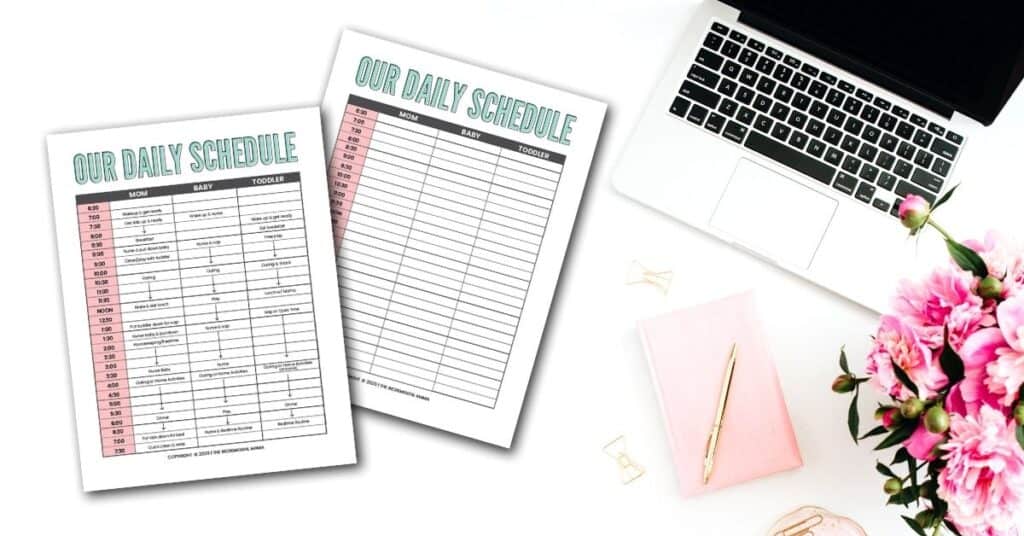
BRINGING CHILD TO THE HOSPITAL TO MEET BABY
Have a gift (from the new baby) for your toddler at the hospital.
Bringing your toddler to the hospital to meet the new baby can be both a nerve-wracking and tender experience. But note that the first time your child sees you with the new baby can be very upsetting for them (my normally very chill 16 month old could only be described as angrily toddler swearing when she first saw me holding her new sister–my 4th).
If they immediately get an awesome present that you make very clear is from the new baby, this can ease the experience and make meeting the baby at the hospital a positive experience.
Plus, it helps them have good feelings associated with the baby. Ideally, the first association they have with the new baby is excitement (which is helped by getting a fun present).
Focus on your toddler in the first encounter with the new baby at the hospital.
Just like with your first, once you hold your second child you will not want to let him/her go. Your heart will grow a few sizes and you’ll want to get in your maternal cocoon and just bond with your new baby.
This is perfect and natural. But when dad or grandma comes in your hospital room with your toddler, switch your focus to your toddler as much as you can. Hand the baby off and snuggle your toddler and get out the present from their new baby.
Again, this can be a really jarring experience for your toddler and you want to do everything you can to ease the blow and help them have a happy, loving experience.
RELATED: Tips to Survive a Toddler and Newborn
THE FIRST FEW WEEKS AT HOME
Help Your Toddler Feel ownership over the baby
One of your main goals is to make sure that the toddler doesn’t feel “unseated” by the baby and instead feels excited about a new sibling.
Involve them in everything you can.
Have them feel like they’re helping in diaper changing, feeding, clothing etc. Depending on age and ability, it may not seem very helpful, but letting them to do what they can will pay off greatly in the end.
This helps them feel big and important and–most importantly–needed by you. It also provides a natural way to teach your toddler the correct way to touch and handle the baby. Example language you can use:
- “Can you get mama a diaper? Good job! You are such an awesome big sister/brother! What a great helper!”
- “You are a big girl/boy. Our baby is so little. We need to be soft and gentle with the baby like this [model behavior]. Can you touch the baby nicely? Good job! You are such a great big sister/brother!”
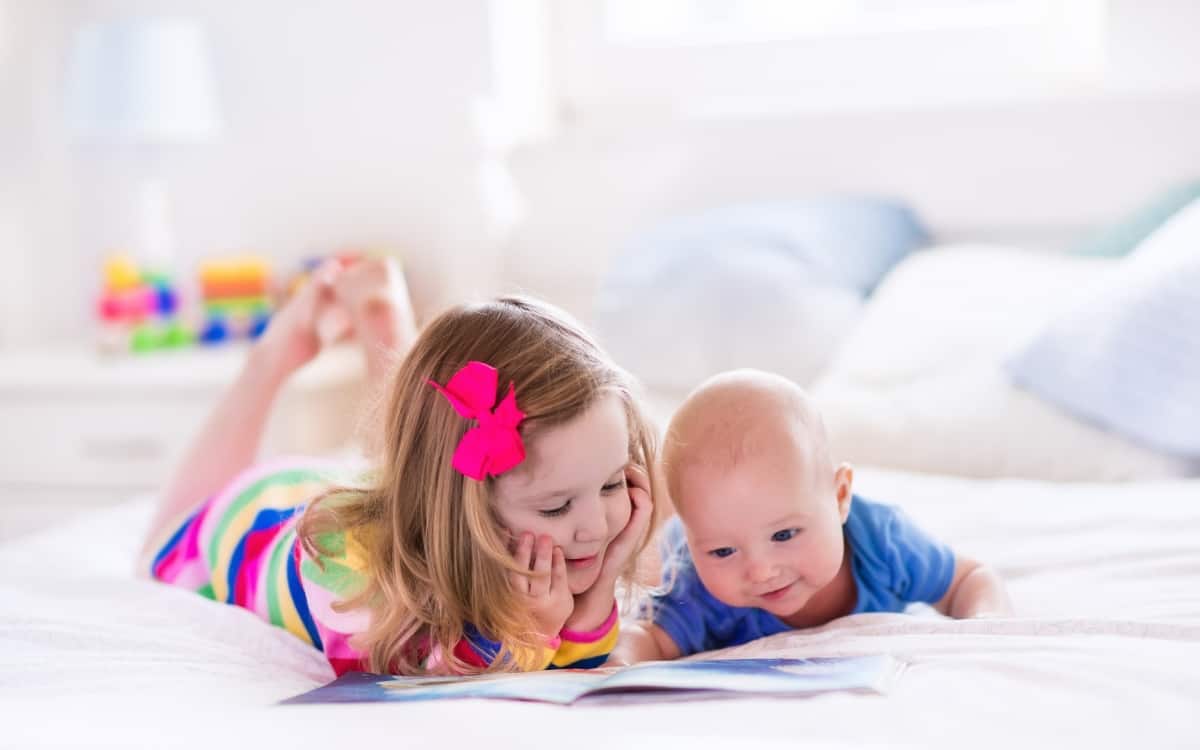
Be Patient With Misbehavior
For a lot of children, this can bring a period of real insecurity. The routine and foundation they have known their whole life has totally been upended.
When that happens, children often act out in order to get the attention that they desire.
This is completely natural. So be as gentle and loving as much as you can. There may be moments that are really tough. You will be sleep deprived and completely exhausted. But do your best to remember that this can be tough for our little ones, as well.
Praise Whenever You Can
In the delirium that can come with a newborn, it can be hard to remember. But effective praise goes a long way in shaping children’s behavior.
Build up your little one with lots of praise for when they interact with the baby and for when they are helping you. Properly praising positive and helpful behavior is incredibly effective at increasing its frequency. This Simple Phrase That Teaches Kids to be Helpful is incredibly effective!
If both are crying, don’t always rush immediately to the crying baby
Though you are pregnant with number 2, perhaps you can’t imagine loving anyone as much as you love your first child.
You may even question if there will be enough love for your 2nd child. Don’t worry, mama. Rest assured that your baby is going to be your new obsession and you will be madly and miraculously in love.
You will rush and jump at every single cry. But there will be times (many times, in fact) when both of your kids are going to need you at the exact same time.
This is the really tough part.
Your instinct may well be to immediately meet the need of your newborn. After all, your newborn is completely helpless. And your toddler is capable of waiting a few minutes while you tend to the baby.
The problem is that your toddler has been #1 since birth and being abruptly unseated is a terribly jarring experience. If suddenly you are always rushing to the baby, and your toddler is always coming in second, s/he may very well act out with misbehavior and have animosity for the baby.
Be aware of the messages you are sending your toddler.
When both are crying, sometimes you should run to your toddler first. Gauge when that is possible. Even if it’s just a quick 10 second snuggle and kiss before you rush to the baby, show your toddler that s/he is important.
Now, I am of the mind that it is impossible to hold a newborn too much. My mom jokes that I never ever set my babies down. I’m 100% all about meeting every single need in the beginning–it’s how to raise confident and content children that don’t needlessly cry.
What I’m saying here is your baby can sometimes cry an extra 5 seconds while you show your toddler their importance.
RELATED: Stay-at-Home Mom Schedule for Toddler and Newborn (with Free Printable)
Don’t Punish Curiosity
Your new baby may be endlessly fascinating to your toddler. Babies are interesting things! While we want to be sure and teach our children correct behavior with the newborn, we want to be careful to not punish mere curiosity.
I was working in the kitchen, my newborn on the floor in an infant bouncer when I suddenly heard her gasping. I turned to see my 14 month old on top of her. Suddenly frantic, I pulled my toddler off immediately and started getting after her for hurting the baby.
While the baby simply took a nice big breath and was perfectly content, my tender-hearted little toddler was completely and utterly inconsolable.
She wasn’t trying to hurt her (and she didn’t). She was simply curious.
As I held her and loved her while she sobbed, I realized that I needed to better gauge her intentions and help guide her obvious curiosity. Her curiosity was a perfect opportunity to teach her appropriate behavior.
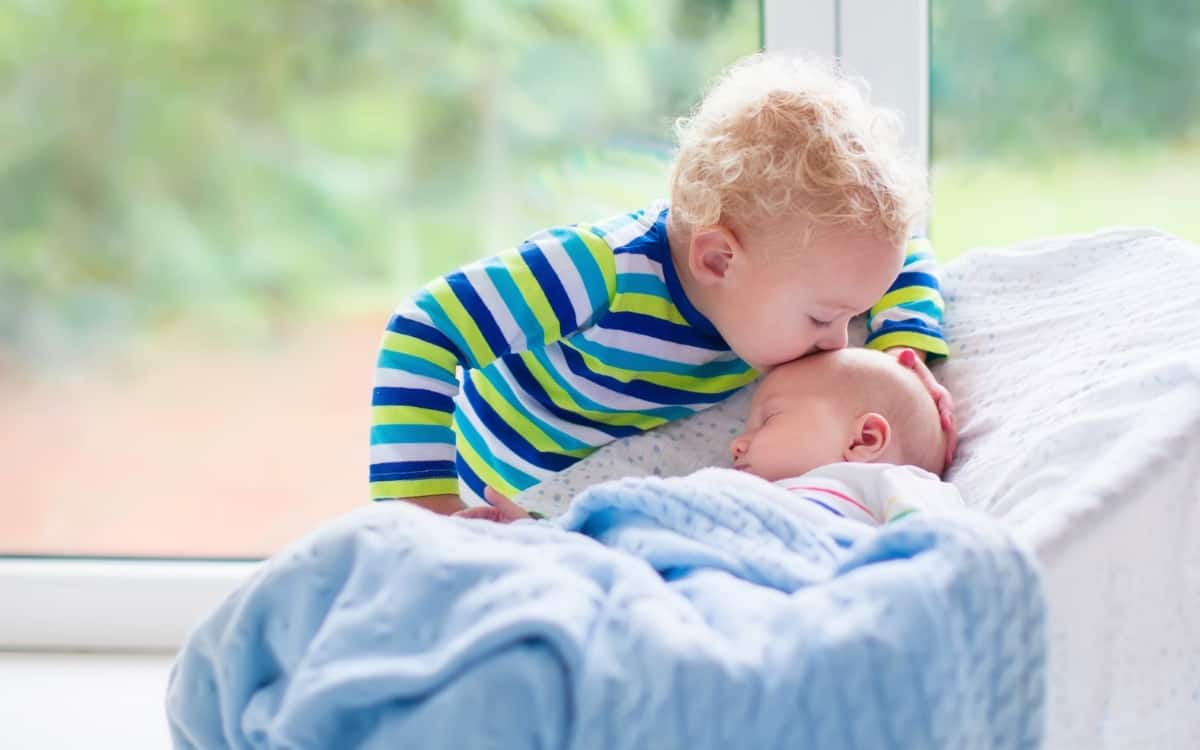
YOU CAN PREPARE YOUR TODDLER FOR A NEWBORN
Whether and 18-month old, a 2-year old, or even a 3 year old, you can prepare your toddler for a new baby sibling. Follow these suggestions for preparing your little one in the months before the birth, dealing with the hospital meeting, and handling the first few weeks after the baby comes.
These tips will help you create the smoothest transitions possible for your little one.
You’ve got this, mama.
ADDITIONAL RESOURCES:
How to Get things Done with a Newborn and Toddler
Stay-at-Home Mom Schedule for Toddler and Newborn (with Free Printable)
Tips to Survive a Toddler and Newborn
20+ Super Easy Activities for Toddlers
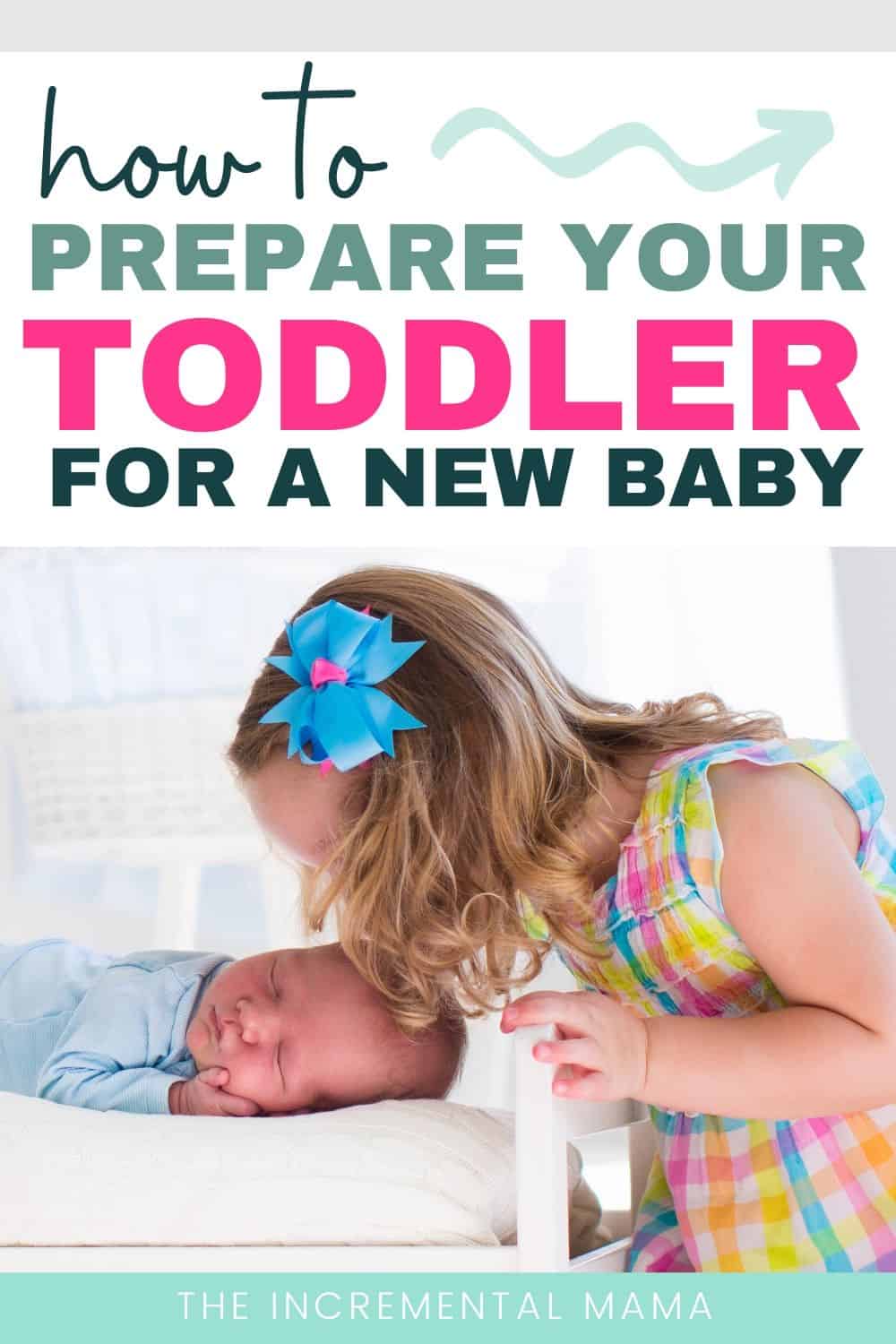





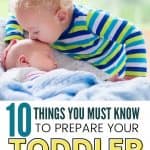
Leave a Reply